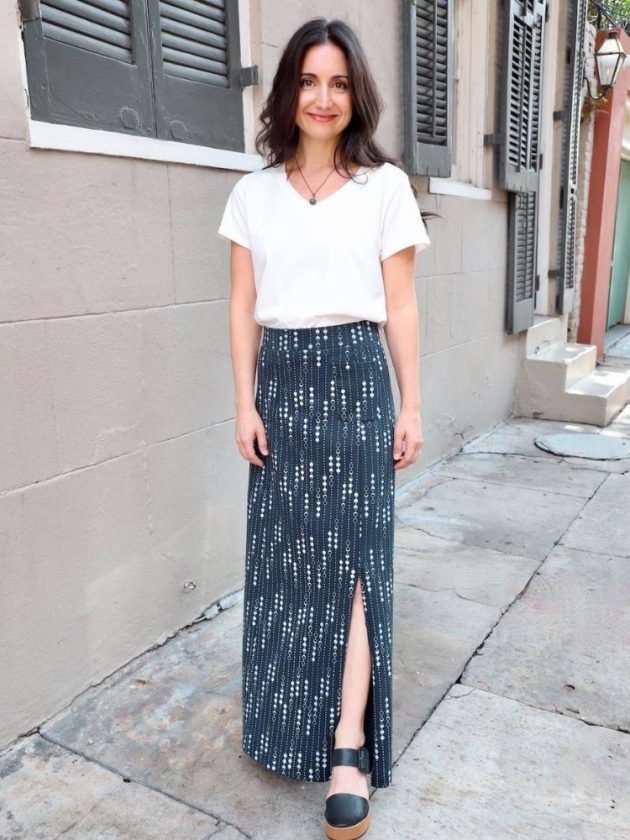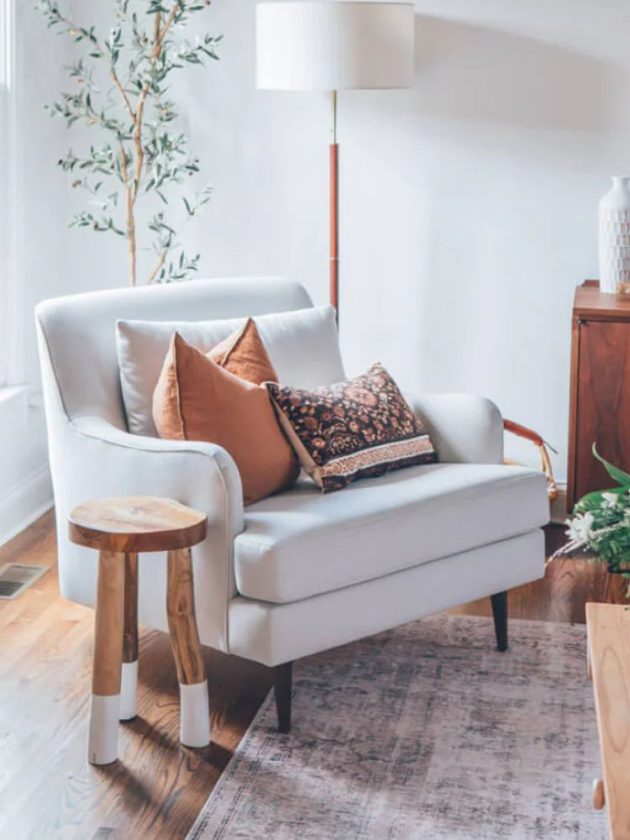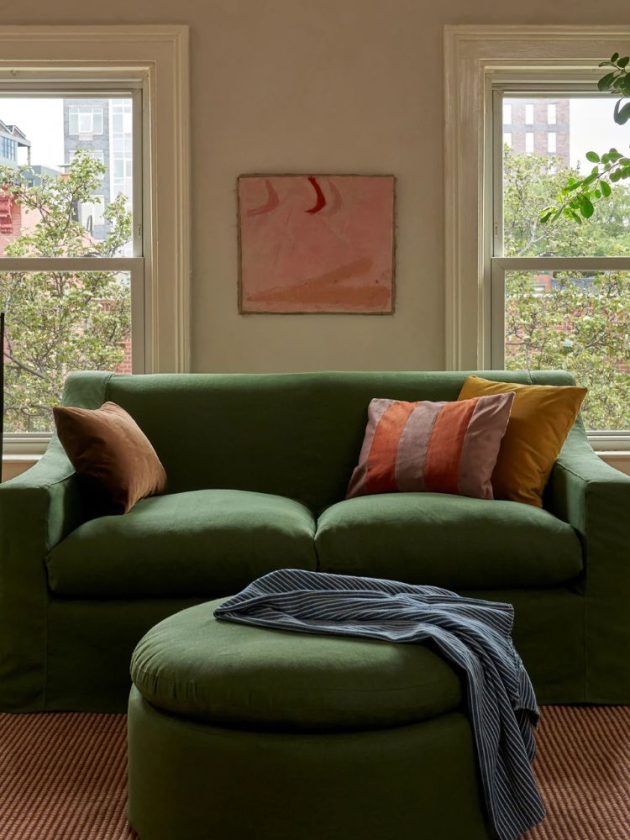The PBS documentary series A Brief History of the Future was an idea whose germination accelerated during the COVID-19 pandemic.
“Right around the time that the pandemic was hitting us, I realized that most of the narratives and stories about the future were based in doom and gloom, right?” said Ari Wallach, co-executive producer and host. “I call it big dystopia.”

Ari Wallach talks with Karen Washington, a farmer in Chester, New York. BetterTomorrows
Wallach is a futurist who has been investigating our planet for years, trying to determine “what does a flourishing society look like on a thriving ecologically-sound planet Earth.” One way to explore this idea was to travel with a film crew and document positive impacts around the globe. Wallach and his team visit a kelp farmer in New Haven, a solar farm in Morocco, a mycelium entrepreneur in New York state and a floating village in Amsterdam, among many other locations. The footage was molded into a six-part, six-hour documentary. The series, which covers not only climate innovators but historians, scientists and thinkers, premieres on PBS on April 3, and Wallach was part of a team that included executive producer Catherine Murdoch (married to James Murdoch, Rupert Murdoch’s son), the UNTOLD studio, and Drake’s DreamCrew production team. The following are excerpts of a conversation with Wallach from his home in Hastings-on-Hudson.
You’re sort of looking at this show as a kind of corrective to the doomsday-based climate narratives out there?
It is a corrective intervention on how we think about the future, which is – yes, there are potentially a lot of bad things that can happen. But guess what? There’s also a lot of potentially great things that can happen. What I say early on in this show is, we often think about what could go wrong, but we don’t often think about what does it look like if it goes right. And there’s multiple rights.
Were there places from your travels that stuck out for you?
It was my first time in Iceland and the folks that I met were very forward thinking. They’re like, here’s what we have. And here’s how we’re going to make it better. We’re going to tap into geothermal. We’re going to grow food in the middle of winter. We don’t have a lot of light. So, we’re going to store light. Parallel to that, when we were in India, we were in this very small village that had decided to go almost completely solar. This was much more of like, here’s how we lean into better futures environmentally, sustainably and for our own health. And that mindset was very different from the one that I’ve been kind of enmeshed in for the past decade plus, especially in the kind of clean green energy space.
When you see these micro examples of people doing things at the very local level, how did that change how you think about things, or did it at all?
A lot of what I did as a kind of host and a guide was pull myself out of the usual rooms that I’m in. I’m in a lot of conference rooms and a lot of organizations… Seeing folks who were acknowledging where they were and where we are as a species on this planet right now, but then saying, okay, let’s acknowledge, but let’s move forward, and move forward in a way that is not pollyannish rainbows and unicorns, but move forward in a way where it’s like, every little bit counts.
You know, I go back to this quote that I always attribute to Al Gore, but I don’t know if it’s really from him. There’s no silver bullet. It’s a silver buckshot. A lot of what we did in our travels was finding the people who are doing the silver buckshot.
When you visited Ecovative (a company producing food, leathers, and materials from mycelium, a fungi) how scalable do you think something like that is and how optimistic does that make you feel about where we can go with food production?
Let’s go back a hundred-ish years to the first couple of oil derricks in Tulsa or the Permian Basin. And now look at the global footprint of oil and big oil. No one back then thought it would scale to being basically how you run a planet. Whether it’s mycelium for food production or for energy or for building materials, people say, well, how can that scale? Look around. A gas station on every corner, a car in front of every home more or less, we scaled it, it worked. And that wasn’t even driven by an emergency. That was just driven by economics. So, imagine if you have economics and a little bit of an emergency situation — that stuff can scale.
You introduce this concept of the intertidal moment – the moment between things in the ocean. But what does this mean for our species?
As a society we’re at an intertidal between what was and what will be. What the show really does is it brings to light different folks and projects and ideas that are for the intertidal moment. They are emblematic of an intertidal mindset of, we got to take a little bit about what we did before, mix it in with this kind of the chaos of the current moment and point us towards what we want. But none of them claim to be the perfect example of the next paradigm. What we show in the series are folks who are doing that with an open, innovative mindset, whether it’s in technology or food or housing or how we think about democracy or even human psychology.
Your team also visits with Boyan Slat (founder of The Ocean Cleanup). What was that like?
The takeaway from Boyan Slat isn’t just what they’re doing, because what they’re doing is very fascinating. They’re cleaning up rivers and taking microplastics or plastic that became microplastics out of the ocean and therefore out of the fish. He basically said, everyone kept saying this is impossible. You can’t do anything. And he just kept saying, what if we just go and clean it up? He said, not everything has to be pie in the sky, Manhattan-project level. Sometimes you just have to do it.
What would you say to people who are becoming overly cynical about climate breakdown?
It’s hard not to be cynical about the fate of our species on planet Earth. We have to recognize, though, that those aren’t all the stories of what’s happening. There are two things you can do. One, curate what comes into your mind… think about the stories that are perpetuated algorithmically to us. These algorithms are receptive to what it is that we’re clicking on. So be careful and think about what you want more of coming on to your information plate. Two, there are things that you need to do in your daily life. We had a lawn, and we’re letting it go to a meadow. What does Ari’s little piece of land have to do with, you know, creating a pollinator pathway? But that helps avoid the cynicism knowing that you’re doing something. There are bigger things. You can donate to candidates. You can march. You can rally. The key thing, though, is to recognize that you have agency, both for your own actions and those around you.
A Brief History of the Future premieres April 3 on PBS. Watch the trailer below.
The post New PBS Documentary Focuses on a More Hopeful Future appeared first on EcoWatch.
https://www.ecowatch.com/brief-history-of-the-future-pbs-wallach-interview-ecowatch.html
Green Living
50 DIY Christmas Presents Anyone Can Make
Last Updated on November 21, 2025
If you’re on the handmade Christmas kick this year, you’re not alone. So am I!
I’m choosing presence over presents this year and bringing back the 90s Christmas I loved as a kid – simple, crafty, low pressure, and full of small moments that feel meaningful.

If you want to gift thoughtfully, and without breaking the bank, these DIY Christmas presents are for you. There’s something for everyone on this list – whether you prefer easy or complex DIYs.
I’ve included all kinds of DIYs – beauty, cooking, fashion, and practical gifts alike. Best of all? Many of these tutorials are zero waste (or close to it).
what are good homemade Christmas gifts?
Good homemade Christmas gifts include consumable items, like homemade nut butters, vanilla extract, or jams. But not all homemade gifts are edible – you can also make items like bath bombs, candles, body scrubs, beeswax wraps, and so much more.
If you’re extra crafty, you could even make wooden gifts (like shelving or tablet holders), ceramic items (like mugs or jewelry), or knitted/crocheted pieces (like blankets, scarves or hats).
It all depends on your level of skill, time at your disposal, and ingredients/materials you have access to.

what are good inexpensive Christmas gifts?
Some good inexpensive Christmas gifts are DIY cornstarch ornaments, handmade body or lip scrub, seasoned salt blends, and homemade treats (like these chocolate chip cookies or vegan sugar cookies).
And never forget to hit up your local thrift store – you can find so many great items that would make affordable gift baskets!
Wrapping DIY Christmas gifts also doesn’t have to be expensive. Reusing gift bags and ribbons from last year, upcycling packaging paper, or even repurposing a scarf for furoshiki wrap are all low-waste and affordable!
RELATED: Gift Wrapping: How to Keep It Easy, Eco and Chic
how can I make a last minute gift?
You can make a last minute gift by getting crafty using the materials you have on hand!
For example, if you have a cardboard box, why not try making an upcycled cardboard dollhouse, vehicle, or pirate ship for a child? For adults, a DIY storage container or a shoe rack works.
One of my fav last minute gifts is scented bath salts in an upcycled glass jar – just a little Epsom salt and essential oil blends will do the trick!
Here’s my list of DIY Christmas gifts – something for everyone and every skill level.

- Bath salts
- DIY makeup like mascara/eyeliner, or lip to cheek
- Bath bombs
- Lip scrub
- Lip balm
- Face mask
- Body lotion
- Natural perfume
- Dry shampoo
- Shampoo bar
- Body soap
- Deodorant
- Rose water toner
- Hand-poured coconut/soy/beeswax candles
- Simmer pot in a jar
- Cookie, brownie, soup mix or hot cocoa mix in a jar
- Handmade seasoning blends
- Vanilla extract
- Vegan caramels or plant-based butter wrapped in compostable parchment paper
- Herb or citrus infused olive oil
- Peanut butter + jam
- Beeswax wraps
- Apple or pumpkin butter
- Sourdough or no-knead artisan bread
- Finished embroidery hoops
- Embroidered pillows, tote bags, clothes or cloth napkins
- Sewn cotton rounds
- Knitted scarf, hat, gloves, sweater, or blanket
- Hand warmers
- Quilt blanet, quilted coat or quilted wallet
- Tie dyed secondhand silk scarves, clothing or sheets
- Hand painted or drawn artwork
- Air dry clay paint palette
- DIY wooden frame for paintings or print photos
- Handmade ceramics (mugs, chawan, chasen holder, vase, spoon rest, etc.)
- Woodworked items (birdhouse, shelving, bookcase, wall guitar mount)
- Carving wooden bowls by hand
- Natural branch coasters
- Plant propagations in one of these DIY planters
- Seed balls using native seeds
- Handwoven baskets or bowls
- Macrame produce bag
- Macrame plant hanger
- Fabric paper mache bowls
- Upcycled paper earring jewelry
- Clay earrings
- Handmade plush toys
- Felt ‘food’ toys
- Wooden toys (like vehicles, blocks, or dollhouses)
- Knit or crocheted baby clothes
What do you think of these DIY Christmas presents? Let me know in the comments!
The post 50 DIY Christmas Presents Anyone Can Make appeared first on Going Zero Waste.
Green Living
8 Best Non Toxic Rugs For a Sustainable Home
Last Updated on November 6, 2025
Did you know most rugs are made from polyester, aka plastic? Arguably, a good chunk of our furniture and home decor is nowadays.
And lets not forget – rugs can get a lot of foot traffic. If it’s made from polyester, chances are those plastic fibers are going to shed and get onto us. Or worse, in us.

Some of the links in this post are affiliate links; for more information please see my disclosure policy.
Microplastics have been found in human feces, blood, and even placentas. And according to a study from Stanford University, those who had microplastics in their plaque had a higher risk of heart attack, stroke and death than those who didn’t.
On top of this, 5 billion pounds of rugs go to waste each year – that’s 2% of total US landfill. And if they’re made from plastic? They won’t biodegrade.
It’s more important than ever to reduce our exposure to microfibers where we can. Which is why I’ve rounded up the best non toxic rugs on the market.
what is the least toxic rug?
The least toxic rug will have sustainable materials and use no harsh chemicals (like PFAs) in their production.
Here’s what to look for when purchasing a non-toxic rug:
- Sustainable materials, such as organic cotton, jute, sisal or wool
- Low-waste packaging + delivery
- Natural, non-synthetic dyes
- Third-party certifications like OEKO-TEK, Fair Trade, GOTs
- Easy to spot-clean or machine wash
- Available in various styles, patterns + colors to suit your needs
do all rugs have PFAS?
According to Department of Toxic Substances Control (DTSC), only four samples of 201 carpets and rugs were found to contain more than 100 parts per million in their fibers, indicating PFAS were intentionally added to the products.
However, while PFAs may not be a huge concern for rugs, microplastic pollution is, specifically if your carpet is synthetic. Your best bet is to check the material your rug is made from and choose natural fibers whenever possible.
what is the best non-toxic rug for nursery?
The best non-toxic rug for a nursery would be made from natural materials like wool and organic cotton (which are soft on baby’s skin).
I recommend also checking for natural latex for the rug backing and underlay pads. Brands on this list that offer kid-friendly sizes and patterns include Lorena Canals, Nestig, Quince, and Loomy (more on each below).
what brand of rugs are non-toxic?
The brands of rugs that are non-toxic are listed below. I’ve gone ahead and highlighted some of my favorite features of each brand, but it isn’t an exhaustive list. Be sure to check out their websites for more information.

1. hook and loom
- Various rug sizes, shapes + patterns
- Made from GOTs certified organic cotton, recycled cotton + wool
- No dyes or harmful chemicals
- No latex
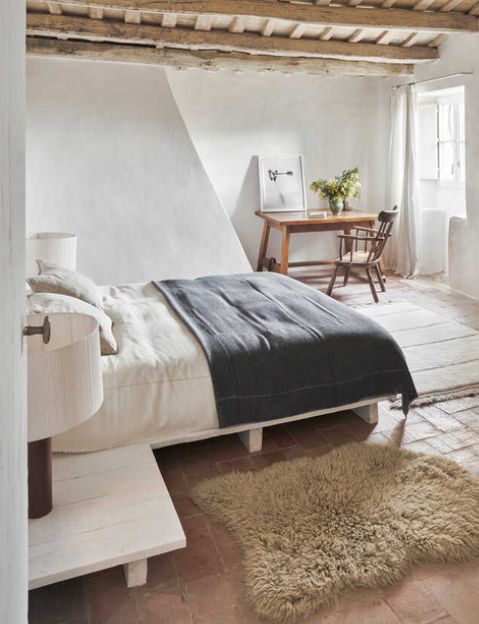
2. lorena canals
- Various rug sizes, shapes + patterns
- Handmade by artisans using recycled materials like organic cotton + wool
- Nontoxic dyes
- Make your own option
- Machine washable
- Rugcycled line made from recycled materials in their own factory
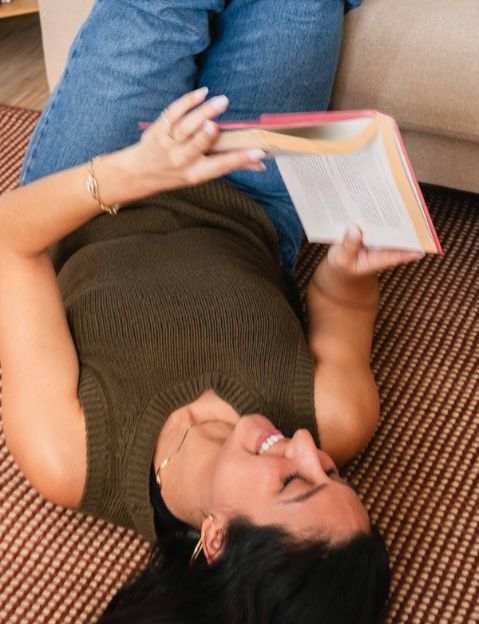
3. sabai
- Field rug
- Woven using wool + jute
- Available in 3 varying sizes
- Rug pad add-on available for reduced movement
- Certified B Corporation

4. quince
- Various sizes + patterns, best known for vintage-inspired looks
- Made from natural materials like wool, jute, + cotton
- Handcrafted by artisans in India
- Transparent pricing practices
- Compostable poly bags + recycled plastic mailers
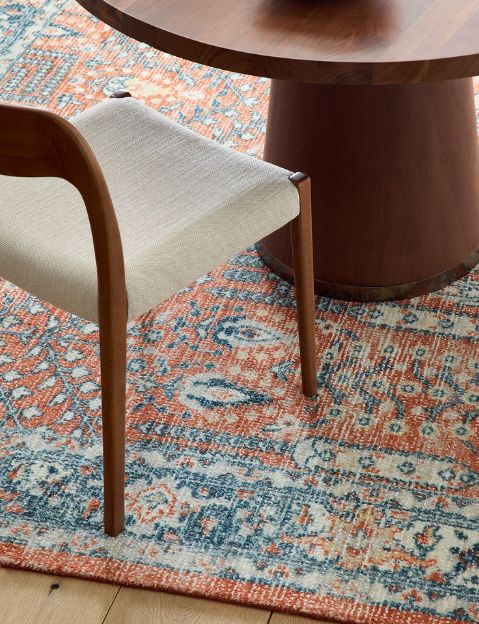
5. west elm
- Rugs for every area of the home, in varying sizes
- Made from wool, jute, hemp, cotton, TENCEL + recycled materials
- Handspun by skilled artisans in India
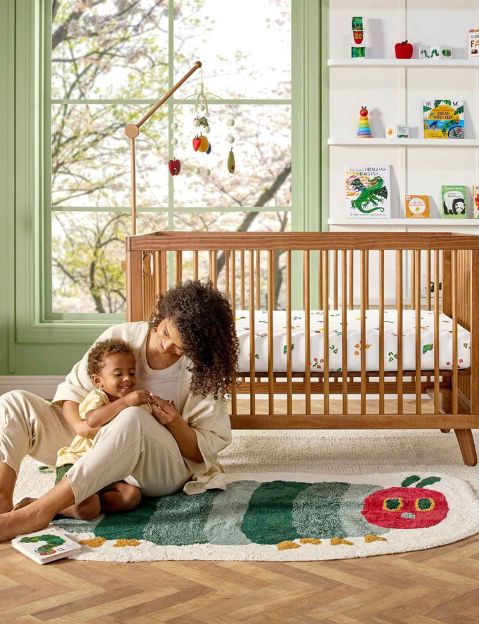
6. nestig
- Area + washable rugs made with fun shapes/designs for babies + kids
- Washable rugs made with organic cotton + nontoxic dyes
- Area rugs made with cotton + each colored element crafted from recycled cotton
- Handmade in Brazil

7. cold picnic
- Various rug shapes + sizes, abstract patterns + bold colors
- Made with wool, bamboo silk, cotton, hemp, + deadstock materials
- Designed in a Brooklyn studio, handmade by artisans in India
- Committed to reducing packaging waste where possible
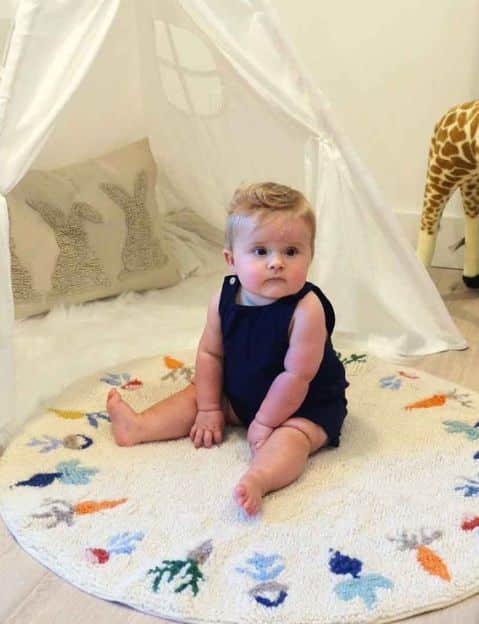
8. loomy
- Various rug sizes, shapes + patterns
- Made from banana silk, hemp, jute, recycled fiber, viscose, or wool
- Any colored yarn dyed using low-impact techniques
- Handcrafted by indigenous artisans
So what do you think of these non toxic, sustainable rugs? Let me know in the comments!
The post 8 Best Non Toxic Rugs For a Sustainable Home appeared first on Going Zero Waste.
Green Living
Our Picks for the Top Black Friday and Cyber Week Sales From Sustainable Brands
It’s not easy shopping consciously during the holiday season — especially during Cyber Week. It’s a time of year notorious for overconsumption, impulse buys, and purchases that are bound for the landfill just months (or even days) later.
But I also don’t believe that sustainable living just looks ONE way. These sustainable and ethical Black Friday discounts can be a way to access better products for more affordable prices. And a great way to support small businesses over big box stores during what is often the most important time for businesses.
Here are some things to keep in mind to engage with Cyber Week and Black Friday more sustainably!
1. A “deal” isn’t a “deal” if we’re buying things we won’t actually use and enjoy long-term (it’s easy to get caught up in the thrill of a deal and buy something that we totally wouldn’t have bought otherwise — been there, done that!)
2. Our whole platform is about challenging overconsumption, but if we want to intentionally purchase some ethical clothing or eco-friendly gifts, these sale days can be a great opportunity to support conscious brands more affordably.
3. It’s worth asking some additional questions and taking some extra time to make these purchasing decisions because the dopamine hit of a good deal can skew our decision-making abilities!
4. If the whole Cyber Week affair stresses you out or you’re feeling pressured to buy more than you originally intended, know that you can step out at any time. Turn off your notifications and get outside and/or spend time with loved ones! You do not need to buy ALL (or any) of your holiday gifts during this week.
But if you’re ready to make a mindful investment in something for yourself, or have a long list of gifts and you want some support in shopping small and consciously, check out this list of the best sustainable and ethical Black Friday and Cyber Week deals going on. Plus, we featured some companies opting out of deals and doing donations instead.
Transparency note: we only feature brands that meet high standards for sustainability we love, that we think you’ll love too. Some of these links are affiliate links, meaning if you purchase via these links we may earn a commission, which helps us continue this site. Thanks for your support!
Here Are Our Top Picks for This Season:
1. Passion Lilie
With elevated womenswear and menswear that pop in prints and weaves, this woman-owned brand champions artisanal techniques like hand block printing and hand weaving to create the most flattering styles that’ll withstand trends.
The brand carefully creates its pieces to make sure they are biodegradable at the end of their lifecycle by using natural fibers like recycled cotton and organic cotton that are treated with organic dyes. Since artisanal craft plays such an important role in their design ethos, Passion Lilie ensures all producer groups they employ are either Fair Trade certified or employ its core practices.
Sale Details: 30% off site-wide with free shipping over $125. Use coupon code BFCM2025. Valid November 26 – December 3
2. Mightly
Founded by four mothers who wanted to create comfortable, long-lasting clothing for active children – minus the toxic chemicals – Mightly is setting the standard for consciously crafted kidswear that takes fun designs just as seriously. Don’t just take our word for it, scroll their site to find Mightly’s delightfully colorful collection of clothing for babies, toddlers, and kids in prints that’ll add a spring in your little one’s step.
Every piece is made using Global Organic Textile Standard certified organic cotton and is sewn at Fair Trade certified factories, ensuring every step of production is responsible.
Sale Details: Tiered discount available sitewide November 25 – December 1.
- 15% off orders of $75+
- 20% off orders of $150+
- 30% off orders of $250+
3. MasayaCo
If you’re seeking artisanal furniture that’ll breathe some character into any space, then look no further. MasayaCo creates a range of handcrafted pieces from reforested teak wood that supports artisans and has an enduring quality. You’ll find versatile pieces to suit nearly every room of your home — and even something for outdoor settings that’ll withstand the elements owing to their naturally water-resistant teak.
MasayaCo has built a restorative model where they grow and manage their own forests, harvesting mature trees for furniture while 30-40% of the reforested land is preserved as a native forest.
Sale Details: 20% off all items and up to 40% off on select items November 19 – December 4. All discounts auto-applied at checkout.
4. Medley
For those who prefer plush, elevated furniture with an inviting appeal, Medley will make you feel right at home with their pieces. Ready to insert a mid-century modern touch into any home, they use time-honored building techniques to offer lasting furniture that ages beautifully.
You can lounge easy on Medley’s pieces knowing that right from the filling to the upholstery, and wood, the materials they use are tested by certifying bodies like OEKO-TEX® STANDARD 100, CertiPUR-US®, and GREENGUARD Gold, to name a few, which indicate the materials have been tested to be free of harmful substances and meet the most stringent standards for low chemical emissions.
Sale Details: TBA | November 28 – December 2
5. Sabai
Nothing adds life to a living room quite like a cozy and inviting sofa. And at Sabai, you’re bound to find a cushy one that’ll serve itself as a centerpiece for the heart of your home. Sabai is on a mission to make sustainable furniture that’s affordable, repairable, and circular.
The company has a range of sofas and loveseats made from recycled and upcycled materials in non-toxic finishes that are completely modular, so they can accommodate and adapt to your changing needs. All of their pieces are created on a made-to-order basis with the option to order up to six swatches free of charge for the discerning decorators.
Sale Details: TBA
The following Black Friday and Cyber Week sales from sustainable brands are sorted by category!
Sustainable Homewares & Furniture Sales
Avocado
Non-toxic brand with low-waste manufacturing offering your bedroom a sustainable upheaval with organic mattresses and bedding
Discount: TBA
Urban Natural
Sustainable home decor and furniture retailer with top brands like Copeland, Cisco Home and East Fork
Discount: TBA
Boll & Branch
Fair trade and organic-certified bedding and bath products
Discount: TBA
The Citizenry
Artisan-made home goods and furniture
Discount: TBA
Coyuchi
Sustainable bedding, bath, home goods, and pajamas made with GOTS-certified organic cotton or regeneratively-sourced fibers
Discount: TBA
My Green Mattress
Non-toxic organic mattresses, bed frames, and accessories
Discount: TBA
Saatva
Eco-friendly memory foam mattresses and organic bedding
Discount: TBA
Savvy Rest
Organic mattress and non-toxic furniture retailer using sustainable natural materials
Discount: TBA
SOL Organics
GOTS-certified organic cotton bedding
Discount: TBA
Ethical & Sustainable Fashion Holiday Sales
Christy Dawn
Slow fashion brand with dreamy dresses and other clothing made responsibly from deadstock fabric, organic cotton, or regenerative cotton grown by Oshadi in India
Discount: TBA
Kotn
Responsible clothing brand offering everyday essentials made from natural fibers with a traceable origin
Discount: TBA
Mate The Label
Loungewear and basics made with non-toxic and organic materials
Discount: TBA
Monica Vinader
Jewelry made from 100% recycled gold vermeil and 100% recycled sterling silver
Discount: TBA
Organic Basics
Eco fashion brand with intimates, basics, activewear and lounge apparel made with earth-minded fabrics
Discount: TBA
PACT
Organic cotton basics and loungewear plus home textiles made in Fair Trade Certified factories
Discount: TBA
Tradlands
Nap dresses, balloon pants, and all things cozy, crafted in sumptuous natural fibers and deadstock materials
Discount: TBA
The RealReal
Luxury fashion consignment site for finding pre-loved designer apparel and accessories
Discount: TBA
The Knotty Ones
Timeless and stylish hand-knitted knitwear made with biodegradable yarns crafted by female artisans living in rural Lithuania.
Discount: TBA
Thesus
Ethical footwear brand with vegan boots and sneakers made from sustainable, traceable materials, including large percentage of recycled materials
Discount: TBA
Vestiaire Collective
Luxury fashion resale site
Discount: TBA
tentree
Eco-minded clothing and accessories brand that plants 10 trees with every order
Discount: TBA
ThredUp
Online secondhand marketplace
Discount: TBA
Subset
Organic cotton underwear and bralettes
Discount: TBA
Brook There
Comfy organic cotton undergarments: underwear, bralettes, and nightgowns cut and sewn in the U.S.
Discount: TBA
EILEEN FISHER
Timeless, high quality slow fashion brand with circularity programs
Discount: TBA
HYER GOODS
Wallets, bags, and other accessories made from upcycled materials
Discount: TBA
Whimsy + Row
Eco-friendly Los Angeles-based clothing label with effortless pieces
Discount: TBA
Toad&Co
Eco-friendly men’s and women’s outerwear and casual clothing
Discount: TBA
Reformation
Sustainably-minded apparel brand actively working towards 100% circularity and building a Climate Positive business
Discount: TBA
Clean and Low Waste Beauty
100% Pure
Fruit-pigmented makeup and plant-based non-toxic skincare
Discount: TBA
Activist Skincare
Woman-owned brand creating high-performing vegan skincare that comes in plastic-free and refillable packaging
Discount: TBA
ILIA
Clean makeup brand — personally I love their Limitless Lash and Super Serum Skin Tint
Discount: TBA
Detox Market
Clean beauty and wellness retailer
Discounts: TBA
Henry Rose
Fine fragrances with 100% ingredient transparency; EWG Verified and Cradle to Cradle Certified
Discount: TBA
Kjaer Weis
Natural makeup brand with low-waste refillable packaging
Discount: TBA
Sustainable Cookware, Cleaning & Daily Essentials
360 Cookware
Non-toxic stainless steel cookware crafted in Wisconsin in the U.S.
Discount: TBA
Blueland
Eco-friendly cleaning supplies, including dish soap and laundry detergent
Discount: TBA
Our Place
Non-toxic non-stick pans made in ethical factories; WOC-owned
Discount: TBA
Enviroscent
Non-toxic, cruelty-free refillable home scents
Discount: TBA
XTREMA
Non-toxic ceramic cookware
Discount: TBA
Dropps
Biodegradable laundry and dishwashing pods
Discount: TBA
We’re continuing to update this post so be sure to bookmark it for later!
In the meantime, check out our gift guide: 30 Sustainable and Ethical Gift Ideas for Everyone On Your List
The post Our Picks for the Top Black Friday and Cyber Week Sales From Sustainable Brands appeared first on .
Our Picks for the Top Black Friday and Cyber Week Sales From Sustainable Brands
-
Climate Change3 months ago
Guest post: Why China is still building new coal – and when it might stop
-
Greenhouse Gases3 months ago
Guest post: Why China is still building new coal – and when it might stop
-
Climate Change2 years ago
Spanish-language misinformation on renewable energy spreads online, report shows
-

 Greenhouse Gases1 year ago
Greenhouse Gases1 year ago嘉宾来稿:满足中国增长的用电需求 光伏加储能“比新建煤电更实惠”
-
Climate Change Videos2 years ago
The toxic gas flares fuelling Nigeria’s climate change – BBC News
-

 Climate Change1 year ago
Climate Change1 year ago嘉宾来稿:满足中国增长的用电需求 光伏加储能“比新建煤电更实惠”
-

 Carbon Footprint2 years ago
Carbon Footprint2 years agoUS SEC’s Climate Disclosure Rules Spur Renewed Interest in Carbon Credits
-
Renewable Energy4 months ago
US Grid Strain, Possible Allete Sale

